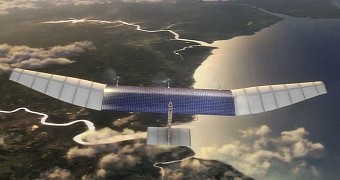Facebook’s plans to help expand the reach of the Internet are accelerating as the company makes plans to create Internet-connected drones.
If this sounds roughly familiar, that’s because Google’s plans are pretty much the same – create a network of devices to help spread Internet to remote areas. The difference is that while Google is playing around with balloons and looks like it may graduate to satellites, Facebook is betting on drones, Wired reports.
“We’re going to have to push the edge of solar technology, battery technology, composite technology. There are a whole bunch of challenges,” said Yael Maguire, engineering director of Facebook’s new Connectivity Lab.
This department was created earlier this year and it’s supposed to help out with Zuckerberg’s goals for Internet.org – bringing Internet to remote locations. The company now wants to create a fleet of solar-powered drones that can be used to connect billions of people to the Internet.
Facebook and Google have to pass many hurdles
Interestingly enough, Google has also acquired a drone-making startup a few months back, named Titan Aerospace. Maguire says that the solar drones Google may want to start building are just as long away from success as their own endeavors. He indicates that aside from the operational and technical difficulties, there are also issues with regulations that need to be overcome before drones can be used for such purposes.
It is, of course, a similar matter to the one where companies want to use drones to deliver products, such as Google and Amazon.
Maguire explained that Facebook’s Internet drones would have to fly above weather and all airspace, which is about 60,000 to 90,000 feet in the air, which is a bit difficult not only from a technical point of view – there are no regulations on aircrafts flying above 60,000 feet in the air. There are rules for airplanes, weather balloons, satellites, but nothing in between.
There’s also the fact that drones are, technically speaking, supposed to have an operator each. Considering the kind of scale that Facebook is planning to give this project, this would be quite difficult. “We need a regulatory environment that will be open to one pilot managing 10 or 100 drones. We have to figure these things out,” the Facebook exec said.
Facebook’s Internet-delivery solar-powered drones are expected to be ready for testing by next year, although the location where this will happen hasn’t been revealed yet. Google’s tests have taken the company abroad, especially those involving the delivery drones.

 14 DAY TRIAL //
14 DAY TRIAL //